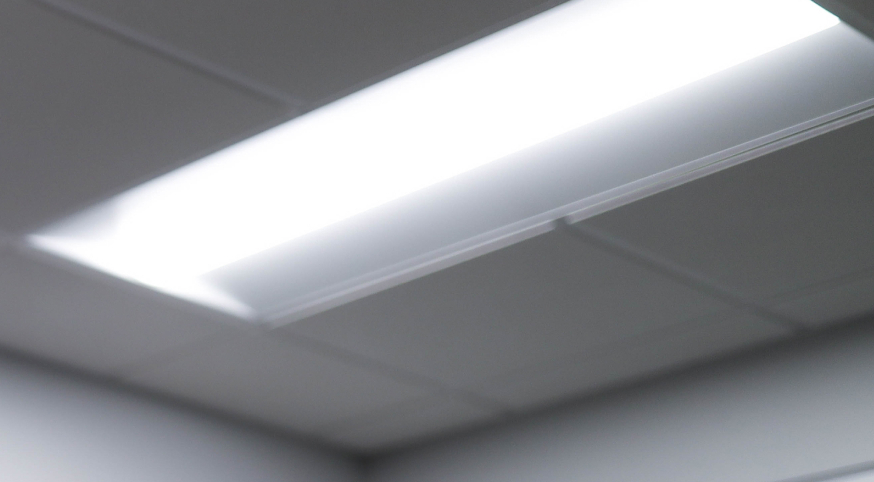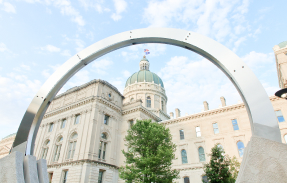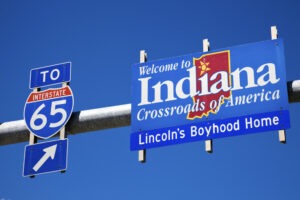
When a car crash happens in Indiana, the at-fault party is responsible for paying for the injuries sustained. This is usually, but not always, one of the drivers involved.
Even when fault seems obvious, it can be contested. Insurance companies have every incentive to interpret the facts in a way that limits their costs and the injured person’s compensation.
That’s one of the reasons you need to know your rights. It’s also why you need experienced legal advice. An Indiana car accident lawyer can investigate and determine what happened and who was responsible.
Who Is at Fault for a Car Accident in Indiana?
Broadly speaking, Indiana law says the driver whose negligence caused the crash is at fault. That means if someone was speeding, texting, drunk, or simply not paying attention, and their careless behavior caused the crash, then they are at fault.
There are no hard and fast rules determining who is at fault for an intersection collision, T-bone crash, left turn or right turn accident, or any other crash. It all depends on the circumstances. An experienced personal injury attorney can help you identify the at-fault party after reviewing the unique details of your case.
When Is the Other Driver Presumed to Be at Fault?
Certain scenarios involve one driver being presumed to be at fault. For example, in a rear-end crash, the driver of the rear vehicle is presumed to be at fault. Likewise, a driver who hits a parked car is presumed to be at fault.
Even in those scenarios, that presumption can be overcome. The vehicle that was rear-ended may have had lights that weren’t working. The car may have been illegally parked and could not have been seen until it was too late to avoid a collision.
Proving That the At-Fault Driver Caused the Crash
You only need to prove that the other driver caused the collision, not why they caused it. In a drunk driving accident, it’s not strictly necessary to prove that the at-fault driver was under the influence of alcohol or drugs.
Instead, it’s sufficient to prove that they were careless and caused the crash. This is one of the reasons why it’s possible to win your civil case against a drunk driver even if the drunk driver is acquitted in criminal court.
While valuable, witness statements are not always reliable. In a T-bone crash or other intersection accident, witnesses may disagree on details like what color the light was. The same is true of crashes while backing out of a parking space, especially in a crowded parking lot where witnesses may have had an obstructed view.
Sorting out what happened and who was responsible requires a detailed investigation. If you call an Indiana personal injury lawyer right after the crash, they can use the fresh evidence at the accident scene to strengthen your case.
Your Case Will Get
The Attention It Deserves

What if Multiple Parties Are at Fault for the Car Crash?
In some scenarios, more than one party can be responsible for a car accident in Indiana. This is most common in chain reactions and other multi-vehicle accidents involving three or more cars.
However, even in a two-vehicle collision, other parties can be responsible in some circumstances, such as the manufacturer of a defective vehicle or the company responsible for maintaining the road surface. Even if only two vehicles are involved, the drivers might each be partially to blame.
Indiana’s Modified Comparative Fault Rule
In situations like this, Indiana uses the principle of modified comparative negligence with the 51% fault rule. That means if you are partially at fault, you can still recover if your percentage of fault is less than 51%.
For example, if you are 30% at fault, you can still recover, but your recovery would be reduced by 30%. However, if you are found 60% at fault, you cannot recover compensation at all.
What to Do After an Accident That Is Not Your Fault
First, remember that the determination of fault isn’t always clear-cut. Even if you don’t think the collision will be blamed on you, you need to be careful. Call the police, wait for them to arrive, and get the investigating officer’s name and badge number to ensure you can later get a copy of the official police report.
To strengthen your personal injury claim, also:
- Take pictures of the accident scene
- Take photos and videos of vehicle damage
- Document any other property damage
- Get names and contact information for any witnesses
- Get medical attention
- Get legal advice
As the injured party, you can recover your losses if a negligent party caused the collision. To increase the value of your claim, your car accident attorney will use a wide range of evidence, including medical records, physical evidence from the scene, witness statements, and proof of your medical expenses.
What Not to Do
Do not discuss fault for the accident with anyone other than your lawyer. To the extent you have to talk to anyone about the accident (the investigating officer at the scene, for instance, and the initial call to your insurance company), stick to the facts of what happened.
Don’t talk about fault, and don’t apologize. Even saying “I’m sorry” could be construed as an admission of fault. Insurance adjusters will use anything you say to dismiss or devalue your accident claim.


Should I Get a Lawyer for an Accident That Was Not My Fault?
If you were injured, the answer is absolutely “yes.” Fault for the accident may be disputed, even if you think it was obvious. Your attorney can investigate, find the evidence that proves the other driver or another party was at fault, and hold them accountable for the damages you suffered.
Even if an insurance company doesn’t dispute liability, they may downplay the severity of your injuries to reduce the amount of compensation they have to pay you. That’s why you need a lawyer to advocate for the full compensation you deserve while you focus on getting better.

Indiana’s Statute of Limitations for Personal Injury Lawsuits
You only have a limited amount of time to take legal action after a car crash in Indiana, and it’s in your interest to act quickly. According to Indiana’s statute of limitations for car accidents, you generally have two years to take legal action.
An Indiana Car Accident Lawyer Can Determine Fault in Your Case
Vaughan & Vaughan has been serving Indiana since 1913. We have helped many clients rebuild their lives after accidents; let us help you do the same.
Don’t let an insurance company lowball your compensation or try to blame the crash on you. Instead, contact us for a free, confidential consultation with a car accident lawyer.






